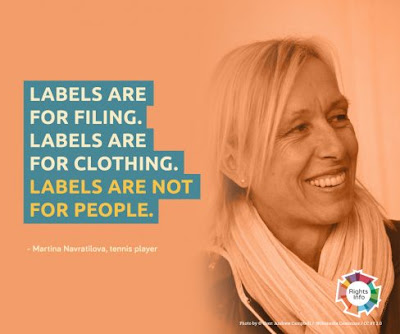Two-cents on "Labels"
Disclaimer: I am neither a psychology student nor have in-depth
knowledge of it, but this is just one of my innermost thoughts that has been
lingering on my mind for...months? I feel like writing about it. Don't worry, I
try to write this according to some trusted sources e.g. journal and
articles written by the experts or those who have educational background
regarding the topic.
Source:rightsinfo.org
Good one, eh?
We often put labels on people, unwittingly. On people, and on
ourselves. Some labels are perceived as good ones, or probably too good to be
true. Some labels are perceived as bad ones. Personally, I don't think those
labels we put on ourselves and on the other people are profoundly good. Labels
here refer to the bad ones and the good ones. Yes, even good labels can be
problematic. According to Cambridge Dictionary, label is a word or a phrase that is used to describe the characteristics or qualities of people, activities, or things, often in a way that is unfair. Labels become our basis in getting to
know people; or distinguish them, to be exact. We put them in the variety of labeled-boxes
in inside our head, and usually those labels are formed perpetually based on
our own experience and understanding. Just take blood type, for
instance. Most of us already acknowledge that it has no scientific basis, that
someone's blood type can affect his/her personality as a whole.
However, some of us often generalize someone's traits based on
his/her bloodtype; “Oh you have B
blood type, no wonder you’re (insert silly-blood type-stereotyping here)”. Even
though some of them might be “coincidentally” true, but it’s actually frankly
ridiculous. Someone's traits cannot be that simple; it's an unceasing process
of development, and so is the understanding of it.
From my standpoint, labeling can be harmful because it affects
self-esteem and limits someone’s self-development. When someone’s labeled as
something, s/he will eventually believe it, even if the label doesn’t actually define
her/him. Lungu (2016) also stated that according to a labeling theory, if a
person is labeled in a certain way, this person starts to conform to that
label, over time. Especially, if it’s continually fed since the younger age and given by persons with authority – like parents, relatives, teachers, bestfriends, colleagues, significant other– the labels have the power to stick to the person, becoming general truths. This means that labels stick if they are consistent, consolidated and applied by persons with authority (Lungu, 2016).
Imagine there was a primary school boy that labeled as “a bad kid” by everyone
around him, including his parents and teachers at the school. The label made
him miserable, he wanted to deny it so much, but he’s stuck with the label that
he started to believe it; that it’s truly him: a bad kid. Can you imagine the
damage that he has to suffer, for years, or maybe a lifetime, because of the
label? He doesn’t feel valuable and reluctant in exploring and respecting his
own worth.
Last
year, someone recommended me a Japanese anime movie called "A Silent
Voice" (2017) (The story and the visual were really pleasing, by the way).
It disclosed a story where a boy named Shōya burdened
a label of " a bully", it stuck to him for years and affected his
social life, even the way he looked at himself. He became a social outcast, he
lost his confidence, all of his friends and thought that he didn't deserve one
anymore; he accepted all of them because he believed that it's the punishment
he deserved. He deserved all the atrocious things that people thought of him
and did to him. Well, I know that he did
terrible thing to the poor girl but he doesn't have to suffer like that either. Moreover, this case happens oftentimes: Every time that someone treats you badly, you take that as
evidence that they are a bad person, and not just that they are a possibly good
person who just happened to do a bad thing. What if they are not actually
a bad person? People
can change. People can be, can do better. That’s how people develop. Don’t live
a stressful life believing that they won’t, and giving vicious remarks and
judgements. It is important to realize that you should not completely define
people in your life solely by their current behavior (Markman, 2014), or something they did in the past.
As for the good labels, if it’s used excessively, the person, especially
a kid, can also possibly develop negative character s or will be discouraged from
making any effort to continually learn (Lungu, 2016). “I am smart, I don’t have
to learn anymore because I understand very quickly”. In the school years, this
can result an educational failure if there’s an absence of exercise and
constant effort. In the case of adults, labels may make them feeling (too) superior
and having such arrogant attitude.
All things considered, labels, either they’re positive or
negative, can alter someone’s self-esteem and limit the self-improvement. As
what Lungu (2016) said, labels, whether they are negative or positive, have the
effect of stopping evolution. It obstructs the right to a choice from various
opportunities. On the long term, labels can affect the personal, professional
and social life of the individual.
Flaxington (2012), once wrote this in an article on Psychology Today: “Why do we need to categorize people anyway? Aren’t labels harmful and stifling for most people? Think of the difficulties caused over the years by assigning names to certain ethic groups, or religions. The label in and of itself puts the person in a box. No matter what they do or say, they can’t get out of that box. The label defines them. Once the person is labeled, it’s very hard for them to move away from that label and to gain another image”.
Labels are not real because they convey messages referring to the
emotional state, the desires and needs of the person creating them (Lungu,
2016). Those labels won’t get through you without your consent. Comprehending
yourself is not the same as self-labeling, though. Don’t hesitate to
do good or speak up for the betterment of the society, just because you don’t want
to be labeled as a SJW (in this context, the term is irrelevant anyway). Don’t hesitate to be sensitive
about certain rude things that people say or do to you, just because you don’t want
to be labeled as a “baperan” person. Also, believe that the persons’ traits are
not simple, what you see and label might be just the tip of the iceberg.
References
Flaxington, B. 2012. Labeling Damage: Do you label others?. https://www.psychologytoday.com/us/blog/understand-other-people/201211/labeling-damage
Lungu, M. 2016. The consequences of labelling on personality
development. Journal Plus Education 14(1):112-131.
Markman, A. 2014. The danger of labelling others (or yourself). https://www.psychologytoday.com/intl/blog/ulterior-motives/201406/the-danger-labeling-others-or-yourself



1st thing 1st: Wow, Maya you writings possess a quality, why don't you submit this incredible work of yours on an online platform? Your substance is very deep (and supported by scientific journal HAHAH) making it reliable for people to read them. Anyhow, that's true, the label. They somewhat put people in certain conditions they never anticipated (more likely burdening to them) you'd better spread out this article!
ReplyDeleteThank you, Mirda, for your encouraging words!❤ Ahaha I probably will!🤧
Delete